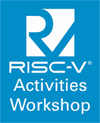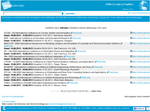Vortrag: "Robust Systems: From Clouds to Nanotubes"
Subhasish Mitra (U Stanford)
Kurzfassung
Today’s mainstream electronic systems typically assume that transistors and interconnects operate correctly over their useful lifetime. With enormous complexity and significantly increased vulnerability to failures compared to the past, future system designs cannot rely on such assumptions. At the same time, there is explosive growth in our dependency on such systems.
Robust system design is essential to ensure that future systems perform correctly despite rising complexity and increasing disturbances. For coming generations of silicon technologies, several causes of hardware failures, largely benign in the past, are becoming significant at the system-level. Furthermore, emerging nanotechnologies such as carbon nanotubes are inherently highly subject to imperfections.
This talk will address the following major robust system design goals:
- New approaches to thorough test and validation that scale with tremendous growth in complexity
- Cost-effective tolerance and prediction of failures in hardware during system operation
- A practical way to overcome substantial inherent imperfections in emerging nanotechnologies
Significant recent progress in robust system design impacts almost every aspect of future systems, from ultra-large-scale networked systems, all the way to their nanoscale components.
Curriculum Vitae
 Professor Subhasish Mitra directs the Robust Systems Group in the Department of Electrical Engineering and the Department of Computer Science of Stanford University, where he is the Chambers Faculty Scholar of Engineering. Prior to joining Stanford, he was a Principal Engineer at Intel Corporation.
Professor Subhasish Mitra directs the Robust Systems Group in the Department of Electrical Engineering and the Department of Computer Science of Stanford University, where he is the Chambers Faculty Scholar of Engineering. Prior to joining Stanford, he was a Principal Engineer at Intel Corporation.
His research interests include robust system design, VLSI design, CAD, validation and test, and emerging nanotechnologies. His major honors include the ACM SIGDA/IEEE CEDA A. Richard Newton Technical Impact Award in Electronic Design Automation, which honors an outstanding technical contribution published at least 10 years before the presentation of the award, the Presidential Early Career Award for Scientists and Engineers from the White House, the highest United States honor for early-career outstanding scientists and engineers, and the Intel Achievement Award, Intel’s highest corporate honor. He and his students published several award-winning papers at major venues: IEEE/ACM Design Automation Conference, IEEE International Solid-State Circuits Conference, IEEE International Test Conference, IEEE Transactions on CAD, IEEE VLSI Test Symposium, Intel Design and Test Technology Conference, and the Symposium on VLSI Technology. At Stanford, he has been honored several times by graduating seniors "for being important to them during their time at Stanford."











